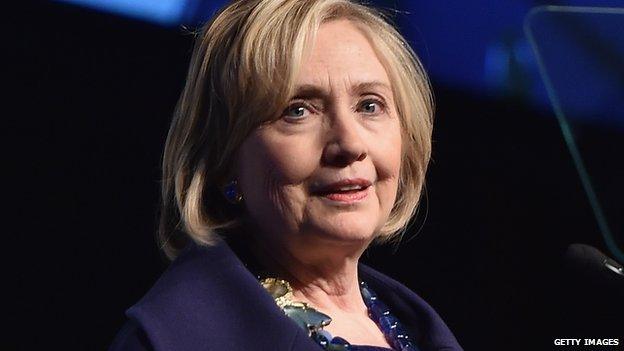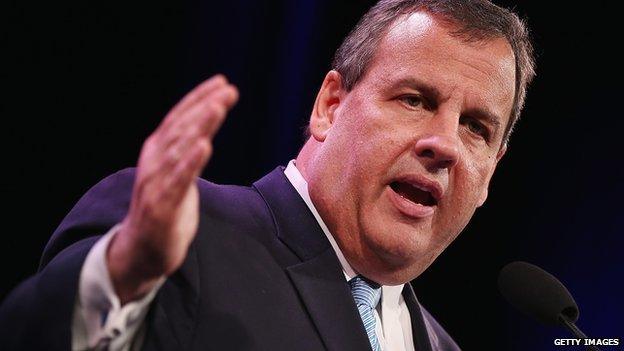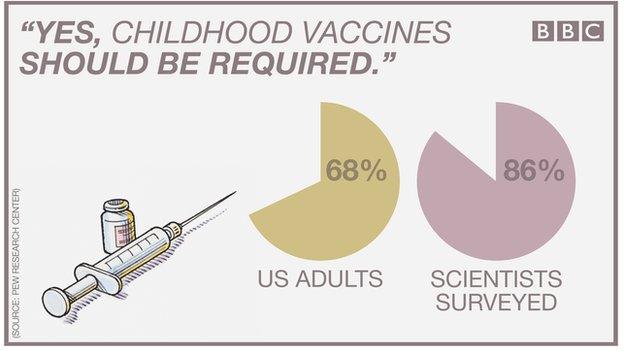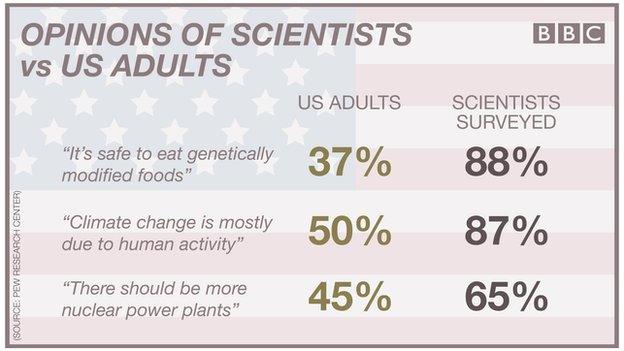Measles politics: Hillary Clinton says 'sky is blue and vaccines work'
- Published
- comments

If the measles outbreak and resulting vaccine debate wasn't a political issue before this week began, it is now.
Thanks to New Jersey Governor Chris Christie's off-the-cuff statements in the UK on Monday endorsing "a measure of choice" as to whether to immunise their children against measles, several of his fellow high-profile presidential aspirants have decided to weigh in on the topic.
On Monday evening former US Secretary of State Hillary Clinton came down firmly on the pro-vaccine side, tweeting, external: "The science is clear: The earth is round, the sky is blue, and #vaccineswork. Let's protect all our kids."
She ended her message with the hashtag "#GrandmothersKnowBest", yet another hint that her newly minted grandmaternal status could be leaned on heavily to provide her with a softer image as she gears up for her possible campaign for the Democratic presidential nomination.
Meanwhile Kentucky Senator Rand Paul took a decidedly different tack on Monday, reiterating his position that most vaccines should be "voluntary" and that parental choice is "an issue of freedom".
"I don't understand the point of why that would be controversial," the Republican told a CNBC interviewer, external, adding that he's a "big fan" of vaccines. But, he said: "I have heard of many tragic cases of walking, talking normal children who wound up with profound mental disorders after vaccines".
"The state doesn't own your children," Mr Paul, who has placed near the top of many polls of Republican primary voters, concluded. "Parents own the children."
The latest political debate started on Monday morning, when Mr Christie noted that while he and his wife decided to have their children vaccinated, that solution may not be best for all parents.
"It's much more important, I think, what you think as a parent than what you think as a public official," he said. "But I also understand that parents need to have some measure of choice in things as well. So that's the balance that the government has to decide."
He continued: "I didn't say I'm leaving people the option, what I'm saying is that you have to have that balance in considering parental concerns because no parent cares about anything more than they care about protecting their own child's health. And so we have to have that conversation. But that has to move and shift, in my view, from disease type. Not every vaccine is created equal, and not every disease type is as great a public health threat as others."

Despite being effectively eradicated in the US as recently as 2000, a measles outbreak that started at the Disneyland amusement park in California has spread to 14 US states and infected at least 84 individuals. The episode has many Americans blaming parents who, citing religious beliefs or possible adverse health implications of scheduled vaccinations, have opted to delay or skip vaccinations - despite repeated insistence by public health professionals that the risks are minimal.
Within a few hours of Mr Christie's comments, his press office attempted to "clarify" his remarks, writing in a statement, external that "the governor believes vaccines are an important public health protection, and with a disease like measles there is no question kids should be vaccinated".
The fires had been stoked, however - and his remarks have been contrasted with US President Barack Obama's statement on Monday morning that the science supporting immunisations is "pretty indisputable".
"We've looked at this again and again," he said, external on NBC's Today programme. "There is every reason to get vaccinated, but there aren't reasons to not."
Given that Mr Christie, Mr Paul and Ms Clinton are considered likely candidates for president in 2016, much of the debate is being cast in a political light - right versus left; science versus theology; authority versus doubt.
Slate's Amanda Marcotte calls, external rejecting scientific consensus "an art that Republicans have perfected when it comes to climate change and evolution. But, more importantly, the right is just a more comfortable home, ideologically, for anti-vaccination arguments."
Despite Marcotte's contention, the immunisation "debate", such as it is, is difficult to break down on partisan lines. Although she cites a survey, external that shows slightly more self-identified conservatives support the now-debunked link between autism and vaccines, a liberal anti-corporate, natural-living strain of anti-vaccination opinion is just as responsible for the drop in immunisation rates, external in the US as the conservative, anti-government-mandate view.

Republican consultant Rick Wilson tweets, external that Mr Christie is being "wildly irresponsible" in his statements.
"Vaccination is one of the most consequential scientific and medical advances in the history of mankind," he, externalwrites, external. "I'm as libertarian as it comes, but the social contract includes not letting your kids die of preventable diseases or spread them to others."
The increased attention to Mr Christie's recent views have had other writers rehashing 2009 remarks, external by the governor in which he told a radio interviewer he didn't support mandating that children receive the flu vaccine and that parents who believe vaccines cause autism need "a voice in these debates". He also wrote a letter to anti-vaccination parents saying he stands by them "in their fight for greater parental involvement in vaccination decisions that affect children".
They also point out that Mr Christie's public health policies appear inconsistent, as just last year he instituted a mandatory quarantine for a nurse who had returned from treating Ebola patients in Africa despite no evidence that she had contracted the disease.
"It's easy to forget, given Christie's reputation as a no-nonsense pragmatist, but he often finds himself at odds with the medical establishment and basic common sense on issues of health," writes, external the Daily Beast's Olivia Nuzzi.
PoliticusUSA's Justin Baragona calls, external the New Jersey governor a "crass politician".

"It appears he is thinking that he can possibly appeal to the libertarians and upper-middle-class liberals who feel vaccinations are unnecessary, a tool of big government, responsible for autism or any other crackpot reason anti-vaxxers have given for not immunising their children," he says. "At the same time, Christie can tell conservatives his stance is due to an overall distrust of the federal government and scientists, which always sits well with the right."
If Mr Christie's past affiliation with the anti-vaccination movement and his recent comments are, in fact, a calculated way to position himself within the Republican primary electorate, a recent Pew Research survey, external shows he may find pockets of support for his attempts to buck scientific authority.
On a host of different subjects, the US public differs significantly in its views from members of the scientific community. While 68% of US adults say that childhood vaccines should be required, 86% of scientists support it.
The BBC's Alistair Leithead spoke to parents in California about their concerns
Vaccines aren't the only source of significant disagreement - on topics like climate change, animal research, pesticides, nuclear power and offshore drilling, the two groups differ by at least 20%. On the issue of genetically modified foods, 88% of scientists believe they are safe - a view supported by only 37% of the US public.
Public health officials and commentators on the left and the right have been quick to dismiss comments by Mr Paul and Mr Christie as dangerous. But while the Earth is round and the sky is blue, the Pew survey seems to indicate that coming down against mandatory vaccinations may not be the political suicide that some, external may think.